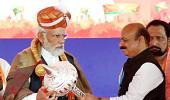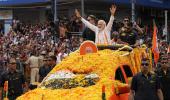'By design or default, the BJP's election strategy militated against the very essence of Karnataka politics and the idea of Karnataka.'

"The people of Karnataka are very clear that they don't want to be governed by the party which is in power at the Centre -- this forms an important part of the political conscience of Karnataka. I would term this as the 'Karnataka version of regional politics'," says A Narayana, professor of public policy and governance at the Azim Premji University, Bengaluru.
Professor Narayana was the Karnataka state coordinator for the World Bank's Land Governance Assessment Framework Project and a consultant for the Karnataka government's high-power committee on restructuring the governance of Bengaluru city. He was also member of the technical committee constituted by the Election Commission of India to promote electoral literacy in India.
"The big political challenge for the Congress is the 36% vote garnered by the BJP... Unless the Congress is able to build a coalition of voters who do not vote for the BJP because they don't like the BJP's ideology, the Congress will have a sword hanging over its head," Professor Narayana, a former journalist, tells Rediff.com's Archana Masih in a two-part phone interview.
What have been your foremost takeaways from the Karnataka mandate?
This election was centred around the idea of Karnataka. The BJP was not fighting the Congress or the JD-S, but the very idea of Karnataka.
Karnataka has the tendency of voting out the ruling party which shows that the state's electorate subjects the incumbent to the highest standards of accountability. This is part of the psyche of the people of Karnataka.
The people of Karnataka are very clear that they don't want to be governed by the party which is in power at the Centre -- this forms an important part of the political conscience of Karnataka and I would term this as the 'Karnataka version of regional politics'.
Since 1983, the state has consistently elected a party which is not in power in Delhi. Even in 2018, Karnataka did not vote for the BJP. The BJP came to power because of 'Operation Kamala' and ruled for the last four years.
Karnataka does not have a regional political party, but this consistent phenomenon is an expression of its regional political aspiration.
The BJP understood that it could not return to power unless it destroyed this particular quality of Karnataka. Therefore, it brandished the slogan of 'double engine sarkar' and projected Prime Minister Modi so that people overlook the factors that contributed to the anti-incumbency.
By design or default, the election strategy of the BJP militated against the very essence of Karnataka politics and the idea of Karnataka.
The result shows that the idea of Karnataka has reasserted itself. In my opinion, this was not an ordinary electoral battle -- a fight between two parties, but a battle which upheld the federal nature of the Indian Constitution.

Do you foresee an arrangement where the chief minister's post will be shared by Mr Siddaramaiah and Mr D K Shivakumar for 2.5 years each with the latter leading the party into the next assembly election?
Will it satisfy both leaders and prevent dissension within the party?
Political dissidence used to be the character of Karnataka political parties, whether there was only one or multiple contenders for the CM's post.
The Congress was plagued by dissension right up to 1994 where the authority of the CM was challenged several times. But there were two Congress regimes -- 1999-2004 and 2013-2018 -- that were totally free from dissidence which shows a maturity and evolution in the party.
It was indeed a long process of evolution -- 1950-1994 -- 44 years -- for the Congress to achieve that level of political maturity.
As far as the CM is concerned it will be decided by the high command, but the public display of maturity shown by both leaders, especially Shivakumar, suggests that this will not pose a problem for the party.
The relationship between the two front-ranking leaders should not be an issue and it is most likely that there will be two CMs in this term.

What do you see as the most potent challenge to the Congress going forward?
The big political challenge for the Congress is the 36% vote garnered by the BJP.
People who vote for the BJP do so because of its ideology. Those who don't vote for the BJP, do not know why they are not voting for the BJP -- they decide not to vote for the BJP not because they don't like their ideology, but for some other reasons.
Unless the Congress is able to build a coalition of voters who do not vote for the BJP because they don't like the BJP's ideology, the Congress will have a sword hanging over its head.
The economic challenge, of course, will be to finance the programmes announced by the Congress, but it is not impossible.
However, nobody questions the BJP about how it will generate funds when it promises to build grand temples and monuments, but when it comes to transferring funds from the exchequer for welfare schemes for the poor it is termed as 'freebies'.
Often public funds are spent on unnecessary projects under the tag of 'development', for example, opening a new airport in Shimoga when there is already an airport in Mangalore within a distance of 200 kms.
One has to see the economic rationale behind such projects and the Congress should have the courage to challenge this sort of development model.
They should also have the conviction in the Constitution to challenge the BJP's communalism which I'm afraid many politicians in the Congress don't have.
Feature Presentation: Aslam Hunani/Rediff.com










